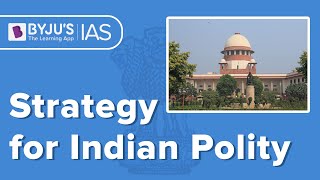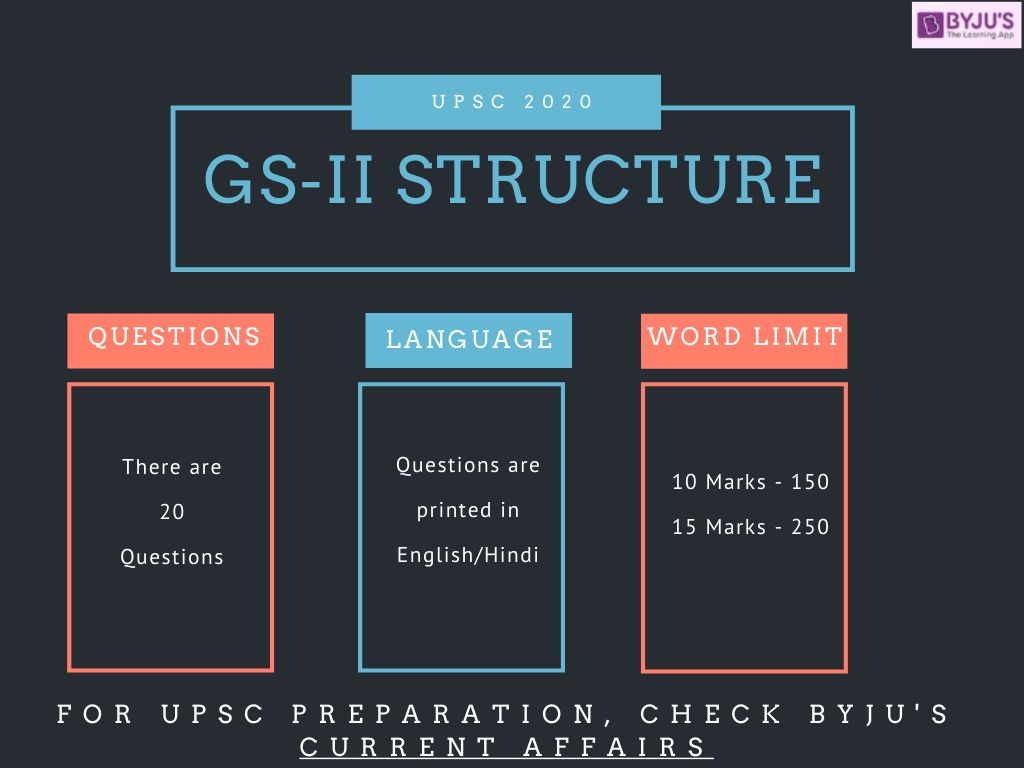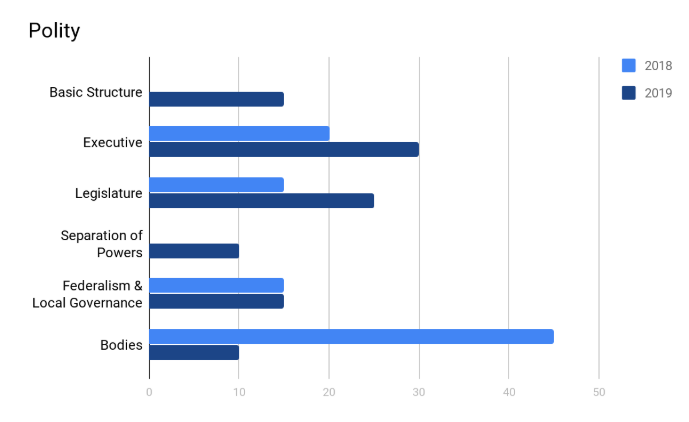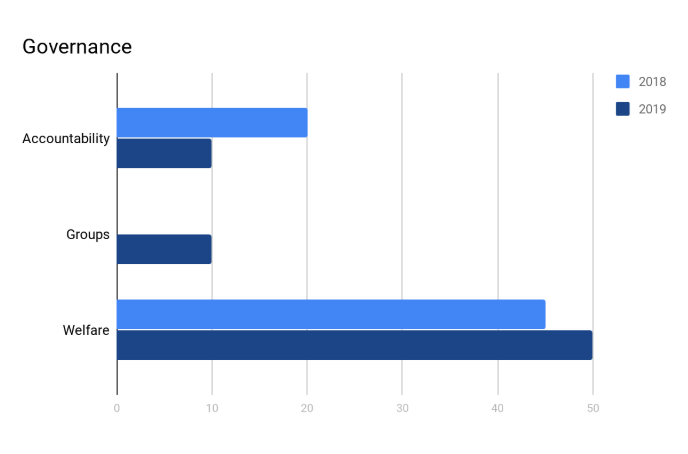UPSC Mains GS-II is one of the nine subjective papers of the second stage of the Civil Services Examination. The UPSC Civil Services Mains Examination is conducted over 5 days. Out of these, the first two papers in IAS Exam – English and compulsory Indian language, are qualifying in nature. Candidates have to secure at least 25% marks in these two to be eligible for merit ranking, based on the rest of the UPSC Mains papers and the interview.
Explore The Ultimate Guide to IAS Exam Preparation
Candidates can refer to the strategy, syllabus, and structure of GS-I, GS-III and GS-IV from the links mentioned below:
| UPSC Mains GS-I Strategy, Structure & Syllabus |
| UPSC Mains GS-III Strategy, Structure & Syllabus |
| UPSC Mains GS-IV Strategy, Structure & Syllabus |
Table of Contents:
IAS Mains General Studies-II
The following subjects are covered in the Mains General Studies Paper-II:
- Governance
- Constitution
- Polity
- Social Justice
- International relations
Like General Studies I, General Studies II has very few direct questions which are related to one topic. This paper needs a fair bit of critical thinking to answer the questions correctly as many times; interrelated topics will appear. If candidates are targeting UPSC 2024, they may check the linked article.
Strategy for UPSC Mains GS 2

Strategy for International Relations:

|
Focus Areas in GS Paper-II |
|
| Subject | Topics |
| Polity |
|
| Governance |
|
| Social Justice |
|
| International Relations |
|
The following table will mention the important sources which an aspirant can refer to prepare for UPSC Mains GS-II:
| Subject | Sources |
| Polity | Books:
|
| Governance | Daily reading of newspaper to be complemented with:
|
| Social Justice | Select articles from ‘The Hindu’ newspaper |
| International Relations |
|
Questions from each of the topics mentioned above are asked in the general studies 2 paper. To get the topic wise GS 2 questions in UPSC Mains, you can check the linked article. These questions can help aspirants devise a strategy to prepare for each of the GS-II topics.
To get answers to the majority of doubts related to topics of Indian Polity subject, please visit the IAS Polity Questions Portal. It contains all the answers tailored to your UPSC needs for the polity subject.
As IAS Mains GS-II is heavily inclined towards current affairs, aspirants can take help from the below-mentioned links to prepare accordingly:
| Daily News Analysis | Best of PIB |
| ARC Reports | Gist of Yojana |
GS-II Structure

Detailed Structure of Mains General Studies Paper-II for IAS
The important features of the UPSC General Studies II Mains paper are:
- There are 20 compulsory questions printed in Hindi and English which are to be answered in the language selected while filling out the application form. Questions that are answered in any other language are not evaluated.
- The paper is of a total of 250 marks.
- The word limit for 10 marks questions is 150, and for 15 marks is 250.
- There is a heavy emphasis on governance and polity related topics, with a significant overlap between them and social Justice and international relations. The type of polity questions is mostly about the applicability of constitutional amendments, rights and significance of certain parts of the constitution.
GS-II Syllabus – Detailed Syllabus of Mains GS Paper 2
The detailed syllabus for UPSC Mains General Studies Paper-II (UPSC GS 2 syllabus) is tabulated below:
| Topic | Sub-Topics |
| Indian Constitution |
Check Previous Years’ Constitution Questions from UPSC Mains GS 2 in the linked article. |
| Governance & Polity |
Candidates can get the relevant Polity Notes for UPSC from the linked article. |
| Governance |
Check the compilation of old Governance Questions from UPSC Mains GS 2 in the linked article. |
| Social Justice |
The Social Justice Questions in UPSC Mains GS 2 are mentioned in the linked article. |
| International Relations |
Click on the links to aid your IR preparation: |
Aspirants can find the complete Indian Polity syllabus for UPSC from the links mentioned in the table below:
| Polity Syllabus for UPSC Prelims |
| Polity Syllabus for UPSC Mains |
| UPSC Political Science & International Relations (PSIR) Optional Syllabus |
GS-II Trend Analysis
As we can see from the UPSC GS 2 syllabus, there is a high degree of overlap between subjects, and this should be kept in mind during preparation. A thorough analysis of current affairs related to UPSC GS 2 as well as a good understanding of the constitution and its structure along with the structure of the government should be a major part of preparation. UPSC aspirants can also refer to IAS Topper strategies to better understand the exam.
Here, we are giving the GS 2 trend analysis for the years 2018-2020. UPSC candidates can read the detailed trend analysis of UPSC Mains GS Paper 2 from 2013 to 2016 in the linked article.
The following table gives the total marks asked in each broad category in GS 2 in 2018-2020.
| Category | 2018 | 2019 | 2020 |
| Polity | 70 | 105 | 125 |
| Governance | 45 | 10 | 30 |
| Welfare | 55 | 60 | 40 |
| International Relations | 80 | 75 | 55 |
| Total | 250 | 250 | 105 |
Now, we analyze each broad category by classifying them into subtopics:
Polity Trend Analysis
The following graph indicates the worth of the total mark of questions asked from each subtopic in 2020:

The following graph indicates the worth of the total mark of questions asked from each subtopic in 2018 and 2019:

Governance Trend Analysis
The following graph indicates the worth of the total mark of questions asked from each subtopic in 2020:

The following graph indicates the worth of the total mark of questions asked from each subtopic in 2018 and 2019:

International Relations Trend Analysis
The following graph indicates the worth of the total mark of questions asked from each subtopic in 2020:

The following graph indicates the worth of the total mark of questions asked from each subtopic in 2018 and 2019:
IAS aspirants can check the UPSC Prelims Subject-Wise Weightage 2011-2019 in the linked article.
Must-Read Important Topics in GS-II for UPSC
The table below mentions the GS-II topics that are important for IAS Exam:
IAS Exam Pattern
Check the table below to understand the scheme and subjects of IAS examination:
|
UPSC IAS Exam |
Pattern of IAS Exam |
| Preliminary Examination |
|
| Mains Examination |
|
| Personality Test | – |
There were significant structural changes in the pattern of the UPSC IAS Exam in 2013 and a few minor changes in 2015 and 2016. The changes related to General Studies are listed below:
- 2013: General Studies papers increased from 2 to 4
- 2015: CSAT marks no longer counted towards merit list, only General Studies papers, essays, and optional papers are counted for merit ranking while CSAT became a qualifying paper.
- 2016: General Studies Papers marks distribution changed to a two-tier system instead of the earlier equal marks distribution for all questions.
Candidates can understand the complete UPSC Exam Pattern from the linked article.
Due to the increasing trend of UPSC papers being analyzed heavy in recent years, it is very important to read and understand the topics covered in the General Studies Paper-II and also previous year’s UPSC questions and answers to be able to answer effectively and efficiently.
The following articles given in the table below can be referred to for UPSC IAS exam preparation:


Content is great
Hii, I am Vijay and I would like to thanks to byjus ias because they have been providing us wonderful syllabus analysis I have been visited numerous websites but I could not find as this kind of explanation thanks byjus ias team members indeed you are really reliable for us ☺️ and your work is unforgettable . So thaks agian and for being help us 🏆🏆🏆🏆🏆🏆🏆🏆
Wonderful thank for help byjus
Thankyou so much byjus🙏🏻❤️ for providing everything related to upsc exam and syllabus on the site
Thank you so much, Byjus you have explained beautifully, which cleared my doubts regarding upsc syllabus.